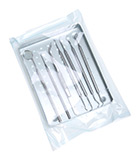 What is the HTM 01-05?
What is the HTM 01-05?
The HTM 01-05 which stands for Health Technical Memoranda is one of several guidance documents in a series if Health Technical Memoranda which give comprehensive advice and guidance on the design, installation and operation of specialised building and engineering technology used in the delivery of healthcare. The HTM 01-05 which was first published in 2009 specifically aims to “progressively raise the quality of decontamination work in primary care dental services by covering the decontamination of reusable instruments within dental facilities.”
On the 28th March 2013 the 2009 HTM 01-05 document was superseded by the new 2013 edition.The new addition is said to reflect “the consensus on patient safety in the area of storage of dental instruments”. With the main changes relating to guidance on storage times following a review of the details published in the 2009 edition. The department of health state that “It is recognised that potentially infectious recontamination of sterilized dental instruments is event-related rather than time-dependent. Within dental practices, there is a rapid turnaround of the most regularly used dental instruments.” The Department of Health (2013) make the admission that, “the 2009 edition was not helpful in the management of these frequently used instruments”.
The changes have arisen following the Department of Health’s realisation that any environmental contamination that takes place would have a minimal impact on patient safety compared with contamination with another patient’s blood or body fluid, which would be a significant hazard to patients. In light of this the Department of Health believe that emphasis should be more on “ensuring effective decontamination and preventing contamination with another patient’s blood and body fluid rather than on preventing environmental contamination of sterilized instruments”.
In addition to the changes relating to storage of dental instruments, the guidance document has also been updated to reflect the changes to the NHS infrastructure following the Health and Social Care Act 2012.
So what has actually changed?
The instrument storage and wrapping recommendations published in 2009 were:
- Where packaging is not applied, instruments may be stored on covered trays and used within that treatment session. Instruments will need to be reprocessed if not used within that treatment session.
- If instruments are wrapped either before or immediately after decontamination, you should develop a quality system approach so that the storage of wrapped instruments does not exceed 21 days for instruments sterilized in a non-vacuum (type N) sterilizer or 30 days if sterilized in a vacuum (type B or S) sterilizer
- Where non-vacuum sterilizers (type N) are used, post-sterilization drying using disposable non-linting cloths should be supplemented by the packaging of instruments – this will improve resistance to contamination and recolonisation in storage.
- For vacuum sterilizers (type B or S), pre-wrapping will extend storage life to 60 days
- Subject to local policy choice, these measures will help to ensure stock rotation and will tend to limit recontamination of stored instruments. Simple but clear record-keeping will be required to make these measures effective.
The NEW 2013 Instrument storage and wrapping recommendations:
- Wrapped instruments may be stored up to 1 year
- pre-sterilization wrapped if type B or S;
- post-sterilization wrapped if type N.
- Unwrapped instruments in the clinical area: maximum storage 1 day.
- Instruments should be: dry; and protected from contamination, for example in mini-racks placed in cupboards or in covered drawer inserts. Instruments should not be stored on open work surfaces, particularly in clinical areas. It is important that practices have well developed protocols and procedures in place to prevent contamination of these instruments by ensuring that those required for a particular patient are removed from their protected environment before treatment commences. This eliminates the need to open cupboard doors or drawers during patient treatment.
- If an instrument does need to be retrieved from a cupboard or drawer during treatment, the practice should have protocols in place to prevent contamination and to ensure that staff hands are clean and that new gloves are donned before handling unwrapped sterilized instruments.
- Regard all instruments set out for each patient as contaminated after the treatment whether or not they have been used.
- Instruments that are kept unwrapped should be reprocessed at the end of the working day, regardless of whether they have been used.
- Alternatively, instruments can be reprocessed at the beginning of the next working day.
- Unwrapped instruments in a non-clinical area: maximum storage 1 week.
- Non-clinical area in this context is designated as a clinical area not in current use or in a clean area of a separate decontamination room.
- Instruments should still be stored as follows: dry; and protected from contamination, for example in mini-racks placed in cupboards, or in covered drawer inserts. Instruments should not be placed on open work surfaces.
- Develop a quality system approach so that the storage of wrapped instruments does not exceed one year.
Although this article aims to give an overview of the recent changes to the HTM 01-05, it is strongly recommended that you read the HTM 01-05 updated guidance. This will help facilitate the updating of your practices policies and procedures to reflect any changes you may want to make in light of the new guidance.
References
Department of Health (2009) Decontamination: Health Technical Memorandum 01-05: Decontamination in primary care dental practices. London, Department of Health
Department of Health (2013) Decontamination: Health Technical Memorandum 01-05: Decontamination in primary care dental practices 2013 Edition. London, Department of Health
DOWNLOAD THE NEW HTM01 05 BOOKLET HERE